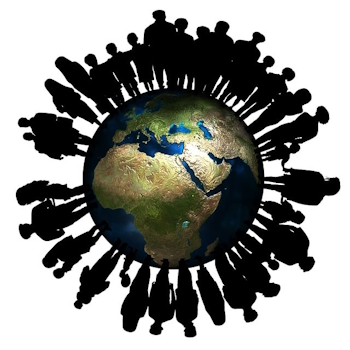I’m no expert on Law Enforcement. I am, however, a lifelong student of systems with experience ranging from agriculture to medicine, business to the military, and of different cultures. I’m sure I’ll aggravate some people with this, maybe these are the right people to be aggravated.
It’s difficult to live in Trinidad and Tobago and not consider crime. To the simple, it is simple, to the political, it’s politics, and there’s little difference between those two. How crime is considered by the populace affects crime itself – it affects the approaches, it affects the way things are implemented, it affects what is actually considered crime outside of the police service and justice systems. There are so many perspectives on it that, on a slow grey morning, I find the time to explore some of them with you, gentle reader.
The Broad Strokes: The Context
In his January 4th, 2018 Bitdepth, Mark Lyndersay mentions the pronounced dichotomy and the grey in between when it comes to how people see crime in Trinidad and Tobago:
…There are at least two societies active in T&T, one committed to all the lovely sentiments that church-going, law abiding citizens are supposed to abide by and another that LOLs at that type of thinking before stuffing a pistol into their cargo pants and going off to demand what they want…
This is, of course, a brief explanation that is accurate in being vague. It’s exactly right. Speaking for myself, as someone who is not church-going, I fall more closely to the first group than the last. And, because of the nature of Trinidad and Tobago, I end up drinking beer now and then around some more close to the latter at local bars. The street knows who the criminals are, and a balance is there between self-preservation and being an extreme law-abiding member of the South Oropouche Police Council for me.
It’s also interesting to note that Mark Lyndersay and I look at things differently in that we’re generally in different circles garnering the perspectives of different people in different ways. This is one of the many reasons I value what he thinks.
And yet, we can talk about crime in Trinidad and Tobago and come to similar conclusions. In fact, most people have very similar thoughts. I’m just taking the time to go deeper into my perspective.
In Trinidad and Tobago, like other places, there is a veil of what remains unspoken in most company. You just don’t talk about certain things, mainly because you don’t know who you’re talking to will talk to with your name attached. I’ve seen it come back and bite others soundly not in their posterior but in their neck over the years – why would decades of experience relent to yet another attempt by
The same is true of at least some members of the Trinidad and Tobago Police Service (TTPS) that I encounter as well. With whispers of corruption echoing through the country beyond what occupies the traditional media, there’s a hard balance to be struck between the police service and the communities that they police. Trust is the core issue, but there is something more endemic: The criminals themselves are ‘law enforcement’ oftheir own areas, sometimes more so than the TTPS, but with their own local ‘laws’.
This leads to the ‘Community Leader’ label that has been applied by politicians for those that operate toward the darker side of grey. The only thing keeping some politicians from those labels are the Laws which don’t necessarily reflect Ethics in society; that so many politicians are lawyers is something that I consider now and then. Community Leaders know each other for what they are, some are just law abiding but have as fluid of ethics as their understanding of Law permits.
This didn’t all just happen one day. It didn’t happen because those without ethics woke up one morning and decided to go on sociopathic or psychopathic sprees; seeds do not grow in soil that is not suited for them.
Socioeconomics
Having came and left Trinidad and Tobago quite a few times over the decades, I have the luxury of snapshots that allow me to see some differences more easily. The poor, as they are, have always been poor. However, people living outside of their means seems to have escalated more. This is not just in Trinidad and Tobago; it’s global, but the degree here in a small island nation is a little more tangible and seems to have accelerated more quickly than other places I have seen.
Why? Well, the most obvious issue is that the economy is arguably not as diversified as it used to be. The sugar cane industry was lost due to government and private industry inefficiencies on a broad canvas of a decrease in demand in sugar due to different sources for sugar, such as corn. Generally, other businesses have been about importing things and reselling them locally; this does well when oil prices are high but it also developed an economical infrastructure that is crippled when oil prices are low. Factor in outright corruption and theft by people sitting comfortably abroad on their ill-gotten gains, and you have what we have now.
Because there was unemployment, the answer was having people cut grass and paint stones white. This was disguised under different acronyms attributed to different political parties by some. This work, sadly, became a means of income near enough to that of a recent University graduate to make it worthy of comparison. Factor in the national pastime of alcohol and politics, like everywhere else, and you find people doing less than more. The minimum wage, something I don’t really agree with in principle due to it’s easily being gamed, is hard pressed to keep abreast of the cost of living.
It seems that there are more single parents, it seems that there are more parents where both partners work to support the family. I write ‘seems’ because there’s really no publicly accessible statistics of worth that I know of; another issue that keeps coming back in my writings.
Because there seems to be more parents working to support their children, there’s less time effectively being spent with children. The moral majority, which is neither, will likely indicate that there are more children having children. Again, I have no statistics. Maybe that’s true, maybe that’s not, but it does seem like the nurture is increasingly required of primary and secondary school education systems whose ability to nurture has become more handicapped. Further, I’d say that the curriculum isn’t as challenging as when I went to school in Trinidad and Tobago – but I am biased and admit that openly.
Meanwhile, one of the other national pastimes of the country is leaving the country. This is what is termed as ‘brain drain’; as someone who could fall into that category, I can say that opportunity in this country is limited – it’s not so much about one’s ability to do things as much as knowing the right people and having enough letters behind your name to make you seem plausible to people who don’t know anything about what it is you do. Even in this downturned global economy, there does seem to be better opportunity for the young to go abroad than to stay… here. The system feeds itself by starving itself.
The centralization of the Trinidad and Tobago budget, too, is a little disturbing. On one hand, the government decides how to support those who supply something locally – for example, chicken – versus those who import. Where money influences politics and businesses that import with more influence, local suppliers are forced to compete at a global level within a limited economy. I don’t know if this is a good or bad thing, but I do know that I’m uncomfortable with a system so easily corrupted controlling such things.
The government now, with less in it’s coffers every year, wants to tax those who are earning less more to compensate for decades of poor planning and lack of diversification. It means less for the government to spend on things to correct the problems that the government created in the first place with bad policy and lack of diversification. Those who like talking about politics will now bring out their knives to stab at their opponents – but really, both sides of the political soap opera contributed and the political discussion simply keeps the easily distracted… easily distracted.
Public servants act like they’re doing you a favor sometimes; in some cases you can find tax-free businesses running to allow people to get through the rampant bureaucracy and poor customer service to get simple things done. Bribery is an open secret. Poor customer service is noted by at least one Minister publicly. This translates to time and money losses for citizens for things already paid for by the citizens of Trinidad and Tobago; in some cases these losses are necessary to avoid penalties and fines that are at least as antiquated as the processes involved.
On the ground, people are not happy with the government – and it’s not a matter of politics if you tune out the politicians. Right now, the national discussion is about how many murders there have been for the year already – more than New York City – and protests in various areas related to infrastructure. One more humorous protest even seems to have worked… so far.
This is, sadly, a result of systems that have worked exactly as designed – except with the perimeters well outside of what the systems were designed for.
Porous borders
I listened as a policeman formerly stationed in Cedros lamented to me that there were 25 points of entry and Trinidad and Tobago Coast Guard support has to happen through calling Port of Spain. All manner of things make their way through the borders on an twin island Republic which boasts a Defence Force on land and a Coast Guard at sea – the former assisting the Police, the latter the Police cannot seem to work with. On islands. I’m no expert, but I would think having rapid response vessels in key areas might cut down on illegal trafficking – from guns to drugs, from people to animals.
Politics
I am amused every time someone laments that whoever is the Prime Minister is at fault for crime – and I write that because indirectly, they are in some ways, but the expectation seems to be that the sitting Prime Minister should don a spandex outfit and go fight crime themselves. There’s a reason, aside from not wanting to see anyone in politics wearing spandex, that this does not happen.
The second politicians directly control the police services, or other matters of national security, and they do so without appropriate checks and balances there is the potential for abuse. Don’t like your Opposition? To the Gulag! Don’t like journalists? To the Gulag! Don’t like someone for any reason? To the Gulag!
So, directly, politicians can’t be blamed for such things. And while we have had Ministers of National Security over the year and all sorts of toys bought by the government to support them, they are little more than figureheads. The problem is so well entrenched that it will not be removed overnight – and, as I pointed out above, the larger view of the nation requires that across the board, policies must be implemented that mitigate socioeconomic issues as well as access to government services.
Silver Bullet?
There is no silver bullet. There is no way to deal with this overnight; this goes well beyond simply ‘fighting crime’ but dealing with the issues that create the fertile ground in which it grows. We live in a connected world now, where the Internet allows people to see things faster than any leader can steer through – but steer they must. The delays of antiquated bureaucracies need to be streamlined with common sense and appropriate technology usage (what we’ve seen so far in technology leaves much to be desired).
It boils down to trust – not trust in politicians, we change those like diapers, but trust in systems of governance.











 It took me decades to figure out something that I should have long ago. Call it naivete. When I first came back to Trinidad and Tobago, I thought my software engineering knowledge and experience would be considered worthwhile and useful, but all too often it was rejected in the need to pursue more local and deprecated technology use. It would drive me nuts.
It took me decades to figure out something that I should have long ago. Call it naivete. When I first came back to Trinidad and Tobago, I thought my software engineering knowledge and experience would be considered worthwhile and useful, but all too often it was rejected in the need to pursue more local and deprecated technology use. It would drive me nuts.

